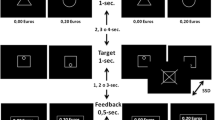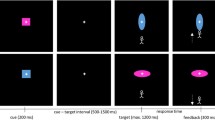Abstract
Two experiments were conducted to examine how cognitive control is modulated by response-contingent reward (Experiment 1) and response-contingent punishment (Experiment 2). The congruency sequence effect (CSE), which is the reduction of the congruency effect after incongruent trials compared to the effect after congruent trials, was analyzed as an index of cognitive control. In both experiments, response speed and accuracy were enhanced by reward or punishment. However, in Experiment 1, the CSE was not evident during anticipation of large reward, whereas a significant CSE was obtained during anticipation of small reward. In contrast, in Experiment 2, the CSE was equivalent regardless of the magnitude of punishment. Moreover, the magnitude of the congruency effect was greater in large punishment than a small one. These results indicate a discrepancy between appetitive and aversive motivations in modulating cognitive control even though both invigorated motor responses. In appetitive motivation, cognitive control is likely to be biased toward a proactive control mode, whereas reactive control is preferable in aversive motivation, where aversiveness also interferes with cognitive processes.


Similar content being viewed by others
References
Berridge, K. C., & Robinson, T. E. (2003). Parsing reward. Trends in Neurosciences, 26(9), 507–513. https://doi.org/10.1016/S0166-2236(03)00233-9.
Boehler, C. N., Hopf, J.-M., Stoppel, C. M., & Krebs, R. M. (2012). Motivating inhibition—Reward prospect speeds up response cancellation. Cognition, 125(3), 498–503. https://doi.org/10.1016/j.cognition.2012.07.018.
Botvinick, M. M., Braver, T. S., Barch, D. M., Carter, C. S., & Cohen, J. D. (2001). Conflict monitoring and cognitive control. Psychological Review, 108(3), 624–652.
Braem, S., Duthoo, W., & Notebaert, W. (2013a). Punishment sensitivity predicts the impact of punishment on cognitive control. PLoS ONE, 8(9), e74106. https://doi.org/10.1371/journal.pone.0074106.
Braem, S., King, J. A., Korb, F. M., Krebs, R. M., Notebaert, W., & Egner, T. (2013b). Affective modulation of cognitive control is determined by performance-contingency and mediated by ventromedial prefrontal and cingulate cortex. The Journal of Neuroscience, 33(43), 16961–16970. https://doi.org/10.1523/JNEUROSCI.1208-13.2013.
Braver, T. S. (2012). The variable nature of cognitive control: A dual mechanisms framework. Trends in Cognitive Sciences, 16(2), 106–113. https://doi.org/10.1016/j.tics.2011.12.010.
Braver, T. S., Paxton, J. L., Locke, H. S., & Barch, D. M. (2009). Flexible neural mechanisms of cognitive control within human prefrontal cortex. Proceedings of the National Academy of Sciences, 106(18), 7351–7356.
Burgdorf, J., & Panksepp, J. (2006). The neurobiology of positive emotions. Neuroscience & Biobehavioral Reviews, 30(2), 173–187.
Davis, M., & Whalen, P. J. (2001). The amygdala: Vigilance and emotion. Molecular Psychology, 6, 13–34.
Dreisbach, G., & Fischer, R. (2015). Conflicts as aversive signals for control adaptation. Current Directions in Psychological Science, 24(4), 255–260. https://doi.org/10.1177/0963721415569569.
Dreisbach, G., & Fröber, K. (2019). On how to be flexible (or not): Modulation of the stability-flexibility balance. Current Directions in Psychological Science, 28(1), 3–9. https://doi.org/10.1177/0963721418800030.
Duthoo, W., & Notebaert, W. (2012). Conflict adaptation: It is not what you expect. Quarterly Journal of Experimental Psychology, 65(10), 1993–2007.
Eysenck, M. W., Derakshan, N., Santos, R., & Calvo, M. G. (2007). Anxiety and cognitive performance: Attentional control theory. Emotion (Washington, DC), 7(2), 336–353. https://doi.org/10.1037/1528-3542.7.2.336.
Faul, F., Erdfelder, E., Buchner, A., & Lang, A.-G. (2009). Statistical power analyses using G*Power 3.1: Tests for correlation and regression analyses. Behavior Research Methods, 41(4), 1149–1160. https://doi.org/10.3758/BRM.41.4.1149.
Frederick, S., Loewenstein, G., & O’Donoghue, T. (2002). Time discounting and time preference: A critical review. Journal of Economic Literature, 40(2), 351–401. https://doi.org/10.1257/002205102320161311.
Fröber, K., & Dreisbach, G. (2014). The differential influences of positive affect, random reward, and performance-contingent reward on cognitive control. Cognitive, Affective, & Behavioral Neuroscience, 14(2), 530–547. https://doi.org/10.3758/s13415-014-0259-x.
Hommel, B. (1993). The relationship between stimulus processing and response selection in the Simon task: Evidence for a temporal overlap. Psychological Research Psychologische Forschung, 55(4), 280–290. https://doi.org/10.1007/BF00419688.
Hommel, B., Proctor, R. W., & Vu, K.-P. L. (2004). A feature-integration account of sequential effects in the Simon task. Psychological Research Psychologische Forschung, 68, 1–17. https://doi.org/10.1007/s00426-003-0132-y.
Jimura, K., Locke, H. S., & Braver, T. S. (2010). Prefrontal cortex mediation of cognitive enhancement in rewarding motivational contexts. Proceedings of the National Academy of Sciences, 107, 8871–8876. https://doi.org/10.1073/pnas.1002007107.
Kim, H., Shimojo, S., & O’Doherty, J. P. (2006). Is avoiding an aversive outcome rewarding? Neural substrates of avoidance learning in the human brain. PLoS Biology, 4(8), e233. https://doi.org/10.1371/journal.pbio.0040233.
Kim, K., & Kim, W. S. (2001). Korean-BAS/bis scale. Korean Journal of Health Psychology, 6(2), 19–37.
Kim, S., & Cho, Y. S. (2014). Congruency sequence effect without feature integration and contingency learning. Acta Psychologica, 149, 60–68. https://doi.org/10.1016/j.actpsy.2014.03.004.
Krebs, R. M., Boehler, C. N., & Woldorff, M. G. (2010). The influence of reward associations on conflict processing in the Stroop task. Cognition, 117(3), 341–347.
Lang, P. J., & Bradley, M. M. (2010). Emotion and the motivational brain. Biological Psychology, 84(3), 437–450.
Larsen, J. T., & Norris, J. I. (2009). A facial electromyographic investigation of affective contrast. Psychophysiology, 46(4), 831–842. https://doi.org/10.1111/j.1469-8986.2009.00820.x.
Loftus, G. R., & Masson, M. E. (1994). Using confidence intervals in within-subject designs. Psychonomic Bulletin & Review, 1, 476–490.
Lovibond, P. F., Saunders, J. C., Weidemann, G., & Mitchell, C. J. (2008). Evidence for expectancy as a mediator of avoidance and anxiety in a laboratory model of human avoidance learning. The Quarterly Journal of Experimental Psychology, 61(8), 1199–1216. https://doi.org/10.1080/17470210701503229.
Lu, C., & Proctor, R. W. (1995). The influence of irrelevant location information on performance: A review of the Simon and spatial Stroop effects. Psychonomic Bulletin & Review, 2(2), 174–207. https://doi.org/10.3758/BF03210959.
Mayr, U., Awh, E., & Laurey, P. (2003). Conflict adaptation effects in the absence of executive control. Nature Neuroscience, 6, 450–452.
Murty, V. P., LaBar, K. S., Hamilton, D. A., & Adcock, R. A. (2011). Is all motivation good for learning? Dissociable influences of approach and avoidance motivation in declarative memory. Learning & Memory, 18(11), 712–717.
Padmala, S., & Pessoa, L. (2010). Interactions between cognition and motivation during response inhibition. Neuropsychologia, 48(2), 558. https://doi.org/10.1016/j.neuropsychologia.2009.10.017.
Padmala, S., & Pessoa, L. (2011). Reward reduces conflict by enhancing attentional control and biasing visual cortical processing. Journal of Cognitive Neuroscience, 23(11), 3419–3432. https://doi.org/10.1162/jocn_a_00011.
Pessoa, L. (2009). How do emotion and motivation direct executive control? Trends in Cognitive Sciences, 13(4), 160–166. https://doi.org/10.1016/j.tics.2009.01.006.
Rogers, R. D., & Monsell, S. (1995). Costs of a predictible switch between simple cognitive tasks. Journal of Experimental Psychology: General, 124(2), 207–231. https://doi.org/10.1037/0096-3445.124.2.207.
Savine, A. C., Beck, S. M., Edwards, B. G., Chiew, K. S., & Braver, T. S. (2010). Enhancement of cognitive control by approach and avoidance motivational states. Cognition & Emotion, 24, 338–356.
Seligman, M. E., & Johnston, J. C. (1973). A cognitive theory of avoidance learning. In F. J. McGuigan & D. B. Lumsden (Eds.), Contemporary approaches to conditioning and learning. Washington, DC: V.H. Winston & Sons.
Simon, J. R. (1969). Reactions toward the source of stimulation. Journal of Experimental Psychology, 81, 174.
Soutschek, A., Strobach, T., & Schubert, T. (2014). Motivational and cognitive determinants of control during conflict processing. Cognition and Emotion, 28(6), 1076–1089.
Stürmer, B., Nigbur, R., Schacht, A., & Sommer, W. (2011). Reward and punishment effects on error processing and conflict control. Frontiers in Psychology, 2, 335. https://doi.org/10.3389/fpsyg.2011.00335/full.
van Steenbergen, H., Band, G. P. H., & Hommel, B. (2009). Reward counteracts conflict adaptation: Evidence for a role of affect in executive control. Psychological Science, 20(12), 1473–1477. https://doi.org/10.1111/j.1467-9280.2009.02470.x.
van Steenbergen, H., Band, G. P. H., & Hommel, B. (2010). In the mood for adaptation: How affect regulates conflict-driven control. Psychological Science, 21(11), 1629–1634. https://doi.org/10.1177/0956797610385951.
Weissman, D. H., Jiang, J., & Egner, T. (2014). Determinants of congruency sequence effects without learning and memory confounds. Journal of Experimental Psychology: Human Perception and Performance, 40(5), 2022–2037. https://doi.org/10.1037/a0037454.
Westbrook, A., & Braver, T. S. (2016). Dopamine does double duty in motivating cognitive effort. Neuron, 89(4), 695–710.
Yamaguchi, M., & Nishimura, A. (2018). Modulating proactive cognitive control by reward: Differential anticipatory effects of performance-contingent and non-contingent rewards. Psychological Research Psychologische Forschung. https://doi.org/10.1007/s00426-018-1027-2.
Yang, Q., Paul, K., & Pourtois, G. (2019). Defensive motivation increases conflict adaptation through local changes in cognitive control: Evidence from ERPs and mid-frontal theta. Biological Psychology, 148, 107738. https://doi.org/10.1016/j.biopsycho.2019.107738.
Yang, Q., & Pourtois, G. (2018). Conflict-driven adaptive control is enhanced by integral negative emotion on a short time scale. Cognition and Emotion, 32(8), 1637–1653. https://doi.org/10.1080/02699931.2018.1434132.
Yee, D. M., Krug, M. K., Allen, A. Z., & Braver, T. S. (2016). Humans integrate monetary and liquid incentives to motivate cognitive task performance. Frontiers in Psychology. https://doi.org/10.3389/fpsyg.2015.02037.
Funding
This research was supported by Basic Science Research Program through the National Research Foundation of Korea (NRF) funded by the Ministry of Science, ICT & Future Planning (NRF-2016R1C1B1016082).
Author information
Authors and Affiliations
Contributions
JMC designed the study and preformed data collection, analysis, and interpretation. JMC drafted the manuscript, and YSC provided critical revisions.
Corresponding author
Ethics declarations
Conflict of interest
Author Jong Moon Choi and Yang Seok Cho declare that they have no conflict of interest.
Ethical approval
All procedures performed in studies involving human participants were in accordance with the ethical standards of the institutional and/or national research committee and with the 1964 Helsinki declaration and its later amendments or comparable ethical standards.
Informed consent
Informed consent was obtained from all individual participants included in the study.
Additional information
Publisher's Note
Springer Nature remains neutral with regard to jurisdictional claims in published maps and institutional affiliations.
Rights and permissions
About this article
Cite this article
Choi, J.M., Cho, Y.S. Impaired cognitive control during reward pursuit and punishment avoidance. Motiv Emot 44, 832–845 (2020). https://doi.org/10.1007/s11031-020-09837-3
Published:
Issue Date:
DOI: https://doi.org/10.1007/s11031-020-09837-3




